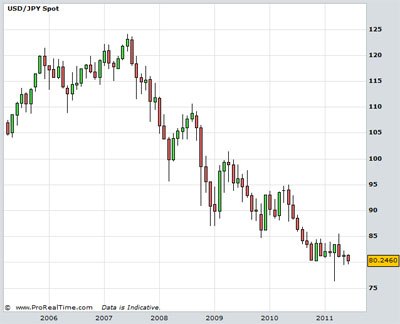Japanese Automakers And Unions To Government: Lower Then Yen, Or We Are Out Of Here

In an (especially for Japanese tastes) strongly worded joint statement, Toshiyuki Shiga. Chairman of Japan Automobile Manufacturers Association, and Koichiro Nishihara, President of the Confederation of Japan Automobile Workers’ Unions threw down the gauntlet to the Japanese government. Executive summary: “We are sick as hell of the high yen and we can’t take it anymore. Do something, or kiss those jobs sayonara.”
Current foreign exchange rate levels represent, for the yen, an appreciation that not only far surpasses all prior projections by Japanese automakers, but also totally fails to reflect Japan’s economic fundamentals.
Having been heavily affected by the devastating March 11 earthquake and tsunami, automobile production in Japan is at last moving towards recovery. The yen’s excessive appreciation risks gravely hampering this nascent recovery and, in doing so, imperiling the resurgence of Japan’s weakened economy.
In view of these realities, JAMA and the CJAWU strongly demand that the Japanese government take swift and effective action aimed at reducing the yen’s current strength.
In other countries, talk like this would be shrugged-off as posturing. A joint statement by employers and unions would raise eyebrows anywhere. In highly polite Japan, such a statement is the last step before a suicide note. Shiga is also the COO of Nissan, a company far less exposed to the high yen than Toyota or Honda. One dollar buys 80 yen today.

Bertel Schmitt comes back to journalism after taking a 35 year break in advertising and marketing. He ran and owned advertising agencies in Duesseldorf, Germany, and New York City. Volkswagen A.G. was Bertel's most important corporate account. Schmitt's advertising and marketing career touched many corners of the industry with a special focus on automotive products and services. Since 2004, he lives in Japan and China with his wife <a href="http://www.tomokoandbertel.com"> Tomoko </a>. Bertel Schmitt is a founding board member of the <a href="http://www.offshoresuperseries.com"> Offshore Super Series </a>, an American offshore powerboat racing organization. He is co-owner of the racing team Typhoon.
More by Bertel Schmitt
Latest Car Reviews
Read moreLatest Product Reviews
Read moreRecent Comments
- Dave M. My sweet spot is $40k (loaded) with 450 mile range.
- Master Baiter Mass adoption of EVs will require:[list=1][*]400 miles of legitimate range at 80 MPH at 100°F with the AC on, or at -10°F with the cabin heated to 72°F. [/*][*]Wide availability of 500+ kW fast chargers that are working and available even on busy holidays, along interstates where people drive on road trips. [/*][*]Wide availability of level 2 chargers at apartments and on-street in urban settings where people park on the street. [/*][*]Comparable purchase price to ICE vehicle. [/*][/list=1]
- Master Baiter Another bro-dozer soon to be terrorizing suburban streets near you...
- Wolfwagen NO. Im not looking to own an EV until:1. Charge times from 25% - 100% are equal to what it takes to fill up an ICE vehicle and 2. until the USA proves we have enough power supply so as not to risk the entire grid going down when millions of people come home from work and plug their vehicles in the middle of a heat wave with feel-like temps over 100.
- Kwik_Shift_Pro4X Where's the mpg?



































Comments
Join the conversation
Imagine the outcry were it was the UAW, and the US Government? Here in Canada the we reaped the benifits of the 70 cent Loony. Today its 1.02 and the CAW is seeing production moving back to the U.S. Sometimes your the windshield,sometimes your the bug.
Hi, I'm your union representative. I want to make sure the $50,000 you are earning, will only be worth $25,000. While at the same time quadrupling the interest you will be charged for every loan you may consider taking up. But it will all be well, since I'll do the same thing to everyone else, so you get the satisfaction of knowing that other people are even worse off than you are. That is what we do, you know. Screw you a little bit less than the next guy. Which, as you know, is very popular these days, after decades of progressive indoctrination hammering into your heads that the only thing that matters, is measuring how you stack up compared to some other group or class. It's always "us" vs. "them". And we, the nice guys leeching off of your dues, will always be looking out for you, you know. Nudge, nudge, wink, wink.....